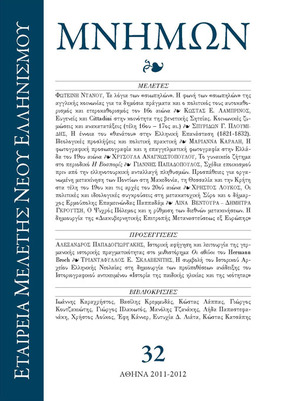Πολιτισμικές μεταφορές και ελληνικές παροικίες : Νέες αναγνώσεις μιας παλιάς ιστορίας με αφορμή το παράδειγμα του Δημητρίου Δάρβαρη
Part of : Μνήμων ; Vol.31, 2010, pages 9-29
Issue:
Pages:
9-29
Parallel Title:
Cultural transfers and Greek merchant colonies : New readings of an old history, based on the example of Dimitrios Darvaris
Section Title:
Articles
Author:
Abstract:
Since the last two decades the theoretical conception of “cultural transfers” has challenged the ways historians have dealt with phenomena of cultural exchanges. Instead of searching for similarities or differences between distinctive cultural entities, the model of “cultural transfers” suggests a more “open” approach of inter- and intra-cultural exchanges, by treating the production of ideas, institutions and cultural patterns, on the one hand, and their diffusion and appropriation, on the other, as interrelated processes. This article attempts to discuss some aspects of the intellectual activity that took place in the Greek merchant colonies of the Habsburg Empire by the end of the 18th and the beginning of the 19th century –n activity, which is assigned to the wider Greek Enlightenment movement- through the perspective of “cultural transfers”. The article examines the case of Dimitrios Darvaris, an emblematic figure of the Greek-speaking education in the diaspora, known for the plenty of his pedagogical writings and schoolbooks. As member of a wealthy merchant family of Vlach origin settled in Vienna, Darvaris was the “organic intellectual” of the Greek entrepreneurial diaspora in Central Europe. His pedagogical work responded to the values and the social needs of the multiethnic bourgeois society that emerged in Vienna by the end of the 18th century with the active participation of the Greek entrepreneurs of the city. This ideological function was performed within a broader educational project, that aimed at the cultivation of the Greek language and the promotion of the Greek-speaking education in the diaspora. It was within the multilingual environment of the Greek merchant colonies in the Habsburg Empire that Darvaris developed innovative didactic methods and new forms of textbooks that renewed the traditional Greek language teaching in the age of Enlightenment. The article examines Darvaris’ work in the context of the language standardization movement that developed in Vienna during the last quarter of the 18th century, with the participation of scholars from different ethnic, linguistic, and religious groups of the Habsburg Empire. In the innovative Greek textbooks by Darvaris the article detects both the influences of the Habsburg school and language reform and the Greek contribution to the language standardization movement in the Habsburg Empire.
Subject:
Subject (LC):




